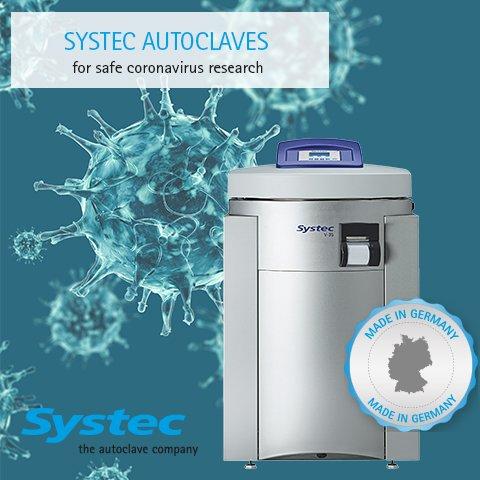How do autoclaves increase safety against coronavirus?
Any further spread of the novel coronavirus can have a negative impact on the current health situation of the international community. This particularly includes the potential spread of COVID-19 through failure to comply with adequate safety standards at biological laboratories. Not only are employees themselves at risk of being infected here, but waste from safety areas could also contain traces of the coronavirus if it has not been sterilized according to WHO standards.
Ideal autoclaves for the coronavirus research according to WHO (BSL-2 / BSL-3)
According to the WHO guideline “Laboratory biosafety guidance related to the novel coronavirus (2019-nCoV)” [link here] in the version from February 12, 2020, the biosafety levels BSL-2 and BSL-3 are required in order to safely handle COVID-19: Laboratories at which diagnostic work such as virus sequencing is conducted should conform to the BSL-2 standard, while laboratories at which the virus is cultivated or otherwise present in high concentrations should operate on the basis of BSL-3.
In both cases, Systec laboratory autoclaves are ideal for sterilization of contaminated waste, instruments, culture media or laboratory equipment to prevent the accidental spread of the coronavirus. This is primarily thanks to three key properties that the WHO stipulates as mandatory or recommends for BSL-2 and BSL-3-compliant sterilization equipment. Systec is offering safe and validatable sterilization solutions with accurate documentation.
Vacuum system
Systec autoclaves have a vacuum system that removes the air from the sterilization chamber of the device in several vacuum pulses before the actual autoclaving process. The cold air can thus be removed from solids (e.g. pipette tips, glassware) and porous materials (e.g. textiles, filters) to guarantee the sterilizing effect of the saturated steam subsequently injected. Thus, for example, Systec autoclaves keep coronavirus pathogens in cold-air enclosures from surviving the heating process.
Exhaust air filtration
A possible danger with autoclaving is the potential of certain pathogens to escape through the exhaust air during the sterilization process before the temperatures required for inactivation have been reached. When working in connection with the corona virus, you can easily prevent this effect by using Systec autoclaves in combination with the feature of exhaust air filtration. Exhaust air filtration uses sterile air filters with a heat-resistant PTFE membrane, which reliably retains microorganisms with a pore size of 0.2 μm. As a result, all escaping gases are passed through the above-mentioned sterile air filter in the heating and sterilization phase. This and the additional condensate activation ensure that no non-sterile or contaminated material can escape from the sterilization chamber.
Accurate documentation
To contain the novel coronavirus, it is paramount to understand its pathways. Systec steam sterilizers guarantee this by digitally documenting all sterilization processes. Among other things, the system records the sterilization temperatures and periods so that any application errors can be traced by laboratory employees. If there is a coronavirus contamination due to faulty work processes, it can be determined exactly which sterilization items are affected and when the faulty process occurred, allowing a resulting infection chain to be quickly identified and interrupted.
China and many other countries rely on Systec autoclaves (made in Germany)
The fact that Systec laboratory autoclaves are perfectly suitable for the sterilization of laboratory waste, culture media and biological hazardous substances according to the WHO guidelines can already be seen from the fact that China, as the epicenter of the epidemic, relies on Systec solutions to research and contain the coronavirus. The Chinese Center for Disease Control and Prevention (CDC) has already purchased a large number of autoclaves through our subsidiary in Shanghai for use at BSL-2 and BSL-3 laboratories across China and many other countries.
Systec helps contain the coronavirus
As the global market leader in the laboratory autoclave industry, we know all about reliable and validatable sterilization solutions with corresponding documentation options. Our autoclaves, in conjunction with adequate occupational safety processes, guarantee the conformity of BSL-2 and BSL-3 laboratories in accordance with the guidelines of the World Health Organization.
Die Systec GmbH ist ein führender Hersteller von Autoklaven (Dampfsterilisatoren), insbesondere Laborautoklaven, Medienpräparatoren und Abfüllgeräten für Flüssigmedien und mikrobiologische Nährmedien. Sie entwickelt und fertigt, zertifiziert nach ISO 9001 und ISO 14001, eine breite Produktpalette für das moderne Labor in Wissenschaft und Forschung sowie der Biotechnologie, Pharmazie, Qualitätskontrolle und Produktion.
Systec GmbH
Konrad-Adenauer-Straße 15
35440 Linden
Telefon: +49 (6403) 67070-0
Telefax: +49 (6403) 67070-222
https://www.systec-lab.de
Telefon: +49 (6403) 67070-0
![]()
